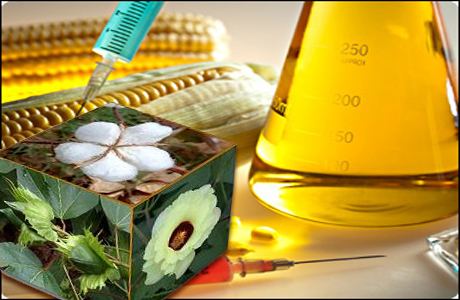GM crops could put food security goal at stake
By
Zafar Bhutta
 A common fear that lurks in the minds of people around the world is that if a country’s food production relies exces- sively on supply of seeds.
A common fear that lurks in the minds of people around the world is that if a country’s food production relies exces- sively on supply of seeds.
And other inputs from a handful of multinationals that have virtual monopoly over genetically-modified (GM) crop technology.
The nation will be forced to compromise on food security.
In India, the Narendra Modi-led central government put field trials of GM crops on hold last month and called for under taking independent investigations into their likely impact on soil, human health, other species and food security.
It also vowed that GM food would not be allowed without full scientific evaluation of its long-term impact on soil and production as well as biological impact on consumers.
However, the Pakistan government looks firmly committed to introducing GM crops in the country.
The cabinet has approved amendments to the seed bill, which allows farmers to exchange seeds but does not permit landlords to sell them. Following the amendments, only certified companies will be able to market seeds.
Another piece of legislation called Plant Breeder Right Act and approved by the prime minister and examined by the Law Division, is also in the pipeline.
The cabinet is likely to take it up in the next meeting.
It will give monopoly rights to US agrochemical and biotechnology giant Monsanto and allow only 30% exchange of seeds by the farmers, a move that will impede the conventional way of seed exchange among small growers and make them overly dependent on multinational firms.
In a report prepared in 2007, the Centre for Food Safety, a national non-profit organisation that aims to protect human health and environment, said, “the near-total reliance on any agricultural technology, including one company’s limited set of biotech traits, is unwise.”
Reports suggest that between 1997 and 2010 Monsanto filed 144 lawsuits against family farmers and settled 700 cases out of court.
Furthermore, food groups say Monsanto investigates hundreds of farmers every year for patent infringement.
Field trial
Experts argue that farmers in Pakistan will be facing the same situation in the wake of monopoly of multinational companies. At present, 770 seed companies are working in the country, meeting around 25% to 30% needs of farmers.
“Farmers provide 75% to 80% of seeds to their fellow farmers,” a senior government official said, adding Monsanto was seeking to create monopoly in the traditional seed marketing system.
The Technical Advisory Committee of the National Bio-safety Committee (NBC) has given the go-ahead to Monsanto for a field trial of its Bacillus Thuringiensis (BT) corn, but the crops of small farmers close to the trial site may be at risk of contamination from the highly-pollinating GM variety.
Critics suggest that the company should be forced to pay compensation to the farmers whose produce is affected following commercialisation of BT corn.
“BT corn can be successful on large landholdings elsewhere, but it will adversely affect smaller farmlands in Pakistan,” an official remarked.
NBC should come up with a mechanism to persuade the company to compensate the farmers whose corn crops are contaminated.
GM corn is quite different from cotton as it requires extra precautionary measures since it is consumed by humans, poultry birds and animals in raw or processed form.
“We have no independent research facilities, but our team is collaborating with Monsanto and Pioneer to investigate the health hazards for humans and animals,” an official of the National Agricultural Research Council told The Express Tribune.
Poor application of rules
Pakistan’s farming community is mostly illiterate and is not aware of the impact of pesticides on human health.
Rules pertaining to pesticides are poorly applied and it will be hard to regulate the restricted application of GM technology.
So far, no credible domestic research is available on the environmental hazards of GM organisms that can affect human and animal health.
“We are banking on the research conducted on BT gene in different countries,” a senior official of the Ministry of Food Security and Research said.
He suggested that the proposal of putting a stamp mark on food crops produced by BT seeds should also be enforced like European countries.
October, 2014
Source:
The Express Tribune